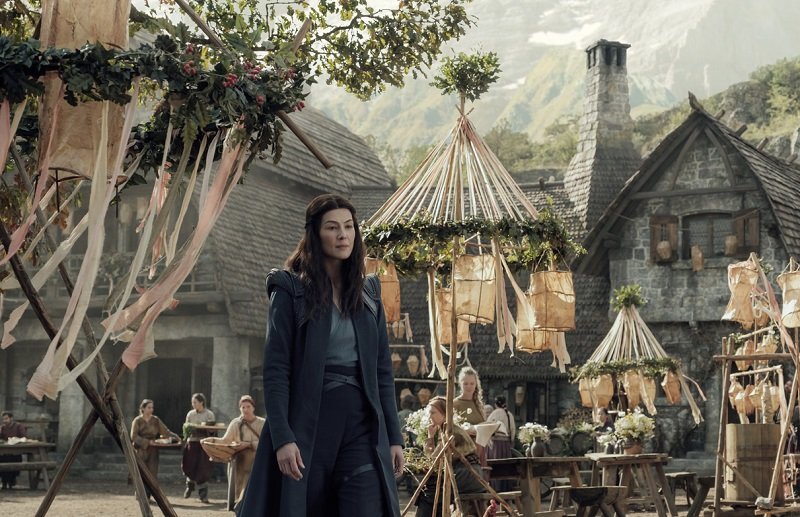Why Season One of Game of Thrones Was Better Than Wheel of Time
Wheel of Time. Image courtesy of Amazon.
As I’ve already written, I think Season One of Wheel of Time suffered from a major problem in its narrative structure, and it also didn’t look very good from a visual and aesthetic point of view. Because of flaws in these areas, it also really didn’t do its world-building very well or convincingly. The Witcher provides a good comparative example for some of these issues, because The Witcher anchored its story around a main character who provides a lens through which the audience can get to know the fantasy world. It also did some very basic visual things better, which made its world feel more fleshed out and real.
Another natural point of comparison which will help to understand where the Wheel of Time went wrong, is Game of Thrones. Now, this comparison is complicated because Game of Thrones’ success has influenced subsequent fantasy epics, like Wheel of Time. I think it’s a virtual certainty that as they were adapting the Wheel of Time, the team at Amazon was probably very consciously trying to NOT be like Game of Thrones in order to chart their own path. And that’s all well and good. But Game of Thrones did several things exceptionally well, and it would be foolish to try and do everything differently, even the things that Game of Thrones did well, just to avoid replication. So in my mind it’s worth discussing what things Game of Thrones did well that Wheel of Time did poorly.
The first thing is that Game of Thrones’ Season One sticks very closely the book. This is true in terms of plot, in terms of character and even dialogue. A lot of it comes straight from the book. They made changes, sure. But they don’t make changes without good reason. Just look at the characters in the show. Ned is still a humorless cynic, who is kind of a boob when it comes to big city politics. Jon is a bitter teenager. Sansa is a spoiled brat. Arya is a wild kid. Bran is a climber, quickly flung from a window. They are are still basically recognizable as their book counterparts.
That is not true in the Wheel of Time show. The most egregious example, of course, is that Perrin kills his wife and then mopes around in a fog of PTSD for the rest of the series. They fundamentally changed his character and his backstory. And for what? This doesn’t add anything to the show. Then there is Rand, who basically doesn’t have a character or backstory because the writers wanted to hide his identity by making him irrelevant. Daniel Henney is a completely different version of the stoic Lan as described in the books. I am not necessarily opposed to having a more human version of Lan, but even so they didn’t have him do anything. These changes did not make the story or the characters better.
Now, there is a reason that Game of Thrones was easier to make as a straight adaptation. George RR Martin was already writing and structuring his first book as a subversive, propulsive narrative. It already subverted genre convention by building the narrative around a traditional protagonist (Ned) and then unexpectedly killing him off. By simply adapting the book the way it was written, the HBO series already had a built-in one-for-the-ages twist. The themes and the characters were also more complex, and less one-dimensional so there was no need to ugly up the characters. Martin already wrote most of them with the flaws built-in.
The Eye of the World is a much more conventional fantasy narrative, built around a Hero’s Journey with very well and clearly defined Good vs Evil characters. There’s not a lot of room for moral ambiguity there. We know who the goods guys are. They are the main characters. But it really feels like the Amazon team did not understand or simply did not want to tell that kind of story. They wanted darker characters, who are trying to resolve traumas (which, more than anything, hints at a very limited imagination when it comes to character arcs). They wanted a cheap twist, so they disguised who the main character was, depriving him of anything to do and preventing the story from being anchored by a consistent narrative lens.
But that’s not the kind of story Wheel of Time is. It never was about cliffhanger endings, or surprise reveals and twists that subvert genre convention. It was never about morally complex characters looking to mature by resolving past traumas (there was sometimes a bit of that but nothing on the level of, oh I don’t know, coming to terms with axing your own wife to death). That isn’t the story that Wheel of Time told, and it isn’t the characters that Wheel of Time created. But Amazon consciously changed many of those points, on purpose, for no reason, instead of giving us an adaptation that at the very least preserved the core character beats and narrative structure.
Game of Thrones was telling a different kind of story, yes. But it was a faithful retelling of the story as it was told in the books, and it was a faithful reproduction of the characters as they were in the books. You don’t need to reinvent the wheel when it’s the Wheel of Time. It is a simple Good vs Evil story about country bumpkins brought into a world-changing adventure, one of whom is the Chosen One. And if Amazon had the wisdom of HBO and simply adapted the story that was given to them, rather than changing many elements including fundamental character traits for no real gain, they could have had a hit on their hands too.






